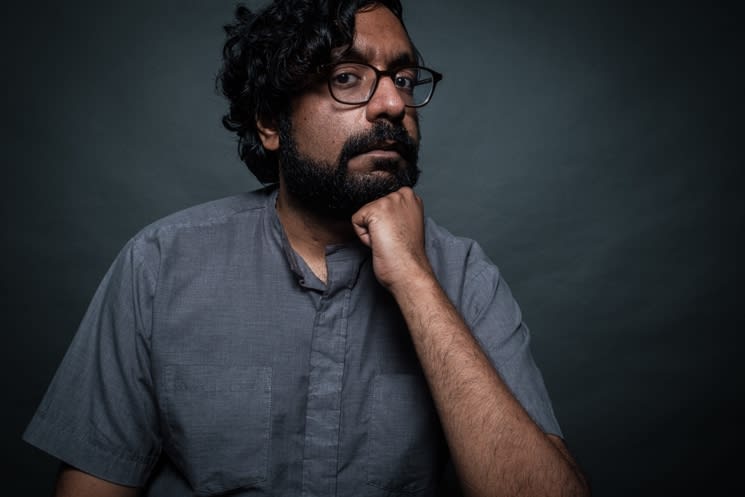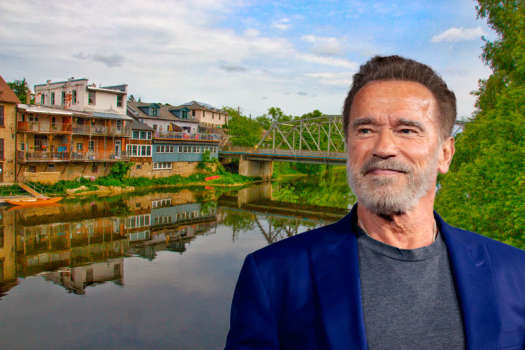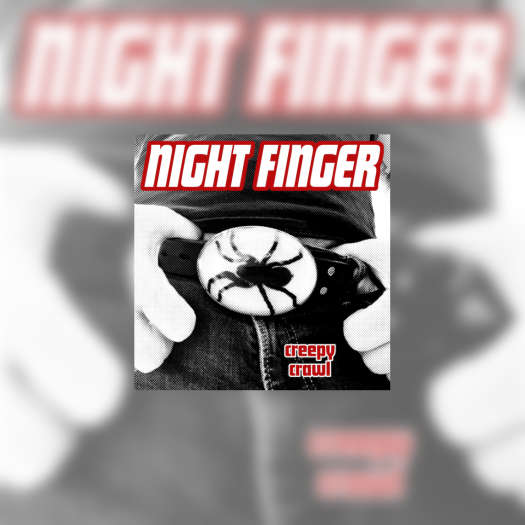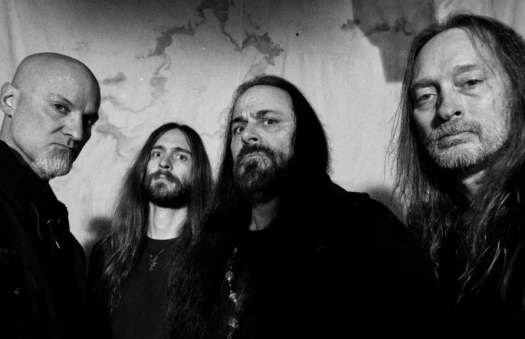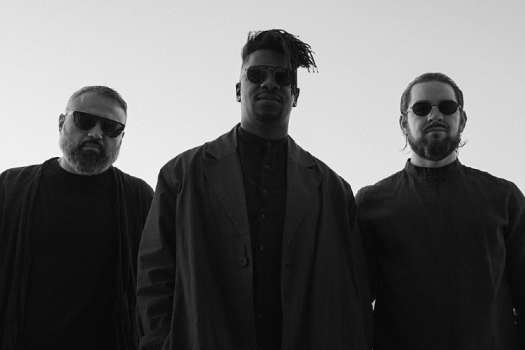"I'm a dad now, so clearly there's a lot going on that has nothing to do with my career," comedian Hari Kondabolu says, speaking from his family's home in Brooklyn, NY. "There was a time where I lived and died off my thoughts and feelings, and I realize they aren't as important as I thought they were. After the child was born, it's like, 'Y'know, those all are second to the million other things this child requires.'"
He adds, "The best part of it, selfishly, is I've tried to find ways, for years, to minimize self. Isn't that like the goal of Buddhism? And all it required was, not meditation, but a child. And now the self is so small. The self is a conduit to making sure my kid is okay."
Kondabolu is a gifted comedian, incisive writer, hard-touring stand-up and influential filmmaker whose parents immigrated to New York from India. Before he was known for directing and starring in the 2017 documentary, The Problem with Apu, which critiqued Indian minstrelsy in Hollywood with a particular emphasis on Hank Azaria's characterization of Apu on The Simpsons, Kondabolu made a name for himself as a working road comic. Over the past decade, he has appeared on every major American late-night TV talk show, has been a frequent guest on NPR shows, and has hosted and guested on numerous podcasts.
He has released acclaimed specials with Netflix and Comedy Central, and three hilarious and thoughtful stand-up albums. His latest special is this spring's Vacation Baby, and he's been celebrating it with a North American tour, including a stop at the Comedy Bar in Toronto on June 29. It's a burst of activity that finds Kondabolu out of the house after being sidelined as a working comic by a pandemic, and then adjusting to life as a dad; his son was born three years ago during a rather precarious time in history for everybody, let alone comedians and writers seeing their careers in great flux, if not crumbling completely.
"One: I'm ready to sell out," Kondabolu says about the current creative landscape for someone with a family to support. "That's one big epiphany I had. I never had that inkling and now I'm like, 'I'll do what you need me to do.' Two: if my child wants to get into the arts and particularly stand-up, I will not be nice about it. This is not something I wish upon my child. And, in some weird way, I feel like I want what my parents wanted for me, for him. 'Go into something with a stable income where you can have a family, younger, and have more energy — don't do what I did.'
"I have a joke in the special: 'Do you realize how hard your grandparents had to work? Don't waste this opportunity.' With their generation, they had this large immigrant community, so the safety net is even bigger than you think; the community makes sure you're okay. They'll never let you forget that you were in peril; that will be brought up for generations. But in this generation, I won't have the same level of an immigrant safety net. It goes down with me!"
Kondabolu's work has long resonated with Indians, and particularly with first-generation Indians and immigrants in North America, who can commiserate with someone who's also grown up in a culture clash, between life at home with one's parents and traditions, and life at school or in a "melting pot," where difference is either self-obscured or, more precariously, highlighted by others. Whenever the diverse audience at the Bell House in Brooklyn is shown in Vacation Baby, viewers see the knowing and occasionally weary faces of Indians who are in deep on Kondabolu's more personal jokes.
"It's a certain type of Indian person," he says, when asked about his most loyal fans. "It has to be somebody who's politically on-board and isn't afraid of the phrase 'white people.' I think, with a lot of South Asians, there is that sense of fear about taking a strong stance on racism publicly, in terms of what the penalty is. I don't even think it's intentional, but the times I hear groans regarding race, it's usually very white crowds, or very brown crowds. If there's a mix of everybody, it's fine. If the crowd is mostly Black or Asian, I don't hear 'Ooooooooh, tsk tsk.' But when it's brown people, there's a feeling of, like, 'Oh god, who's around? Can we say this?'"
He continues, "I don't get that with people who come to see me intentionally and know why they're there. That's what that special was because they know what they're getting. I'm going to be sharp and mean and, not to say unlikeable — though some would argue that — but it's definitely going to be its own thing, and I think the people who've been coming to see me for a long time, they know what that is."
For Kondabolu, The Problem with Apu and its ensuing controversy over race and representation in popular media, was a dividing line in his career. He doesn't hesitate when asked if he feels his life, both working and otherwise, has been altered by the film and its reception. "I do. It's frustrating but the reality is, what my career was before and after is completely different. Before that, I was certainly less known," he explains.
"I did fine in the comedy world but — I'm yawning while talking about this, because I'm bored of the topic," Kondabolu half-jokes after definitely yawning. "For the people who knew my stand-up, doing the documentary wouldn't have surprised them that I'd do something like that, but it's a much softer documentary than what my stand-up has historically been like. My stand-up is more aggressive and brutal than what that documentary was. That's a pop culture documentary about a cartoon character, but it doesn't delve into the depth of racism like I normally would want to. It certainly wasn't the documentary I intended to make, either. I wanted to make something where I wasn't the central figure in it. I wanted it to be about the history of that accent, but also the history of minstrelsy in this country and the hazing process that people of colour have to go through. And I wanted it to be a bunch of interviews cut together with me maybe doing a voiceover.
"But once you sell it to a cable network, that's not gonna work," he reasons. "It's a different vehicle, it certainly got watered down for what I wanted to do, and it was still an interesting process for me to go through, but it certainly wasn't interesting in terms of the content."
Kondabolu grows more animated, saying, "It's not complicated. The idea of having to prove to people that this character is racist and has racial overtones — it's obvious! The idea that I had to prove that in a film was almost insulting in a way, if you actually grew up with it. Why does this need to be proven? Just listen to the character!"
Though The Problem with Apu may be a tiresome and cumbersome topic for Kondabolu (and for good reasons, which he later illuminates), he cannot deny that the film has had a seismic impact on a cultural institution like The Simpsons and one of its longest serving cast members: Apu himself, Hank Azaria.
"I mean, what's interesting is, I don't think I understood how much of an impact it made until me and Hank spoke," Kondabolu explains. "That's been great, because I've become friends with Hank Azaria and the work that he's done on himself, post the film, is extraordinary. In addition to publicly speaking out and saying, 'I don't think I should voice this character, South Asians should be in the room,' he's done a lot of work on himself with regards to anti-racist trainings and being a white ally and actually speaking to groups of white people and trying to explain how representation works and race in this country has worked. He's actually gotten more out of the film than most people have. It's weird that he's gotten the most out of it, because that wasn't the intention.
He adds, "The Simpsons didn't really do anything with the character and kinda just hid from it. It's frustrating because people tell me I wanted to kill this character, when I don't give a shit about this character. 'Nobody really watches The Simpsons, anyway,' is what I thought, until I realized around the world they still do, because I get death threats in Spanish and Portuguese now." He notes that he has had to get extra security for his live shows.
"But, y'know, it's really cool to see the journey Hank's taken and the fact that this thing has this bigger life. And Hank has told me that all the minority characters on The Simpsons are now voiced by people of colour, and some characters even have these back stories now, and he's like, 'All those things have happened because of your documentary. All of these lanes that have never been opened have been opened because of your documentary.' He's saying these are all incredibly good things — the fact that all of these actors have gotten work they've deserved because of this documentary."
"I think hearing it from him and how it's impacted even that show, that feels good. That wasn't the intent. The intent was to talk about this academic thing and it became more of an activist-y thing, which wasn't the point of it. It was about discussing, during these changing times where we have so many more brown people, that this is where we came from. But I guess it had a lot more impact than I ever imagined."
So, clearly The Problem with Apu was impactful and altered the work of one of the central targets of its critical analysis. One might assume Kondabolu would be rather pleased with such an outcome — unless you've followed his work and gotten to know his personality a bit better. Hari Kondabolu is hilarious and outspoken, so it's both amusing and unsurprising to hear him sound ambivalent about his role in all of this change.
"I mean, sure man, but like — I gotta do all this shit so some white people change a character and hire people of colour? It's just annoying. I have to do all this shit so people understand that a clearly racist character is racist? It wasn't the intention, first of all, but secondly, it's annoying. As proud as I am of that it's like, in X number of years, this is all gonna feel absurd. Like, 'Really, that's not obvious to people? He had to make a thing?'"
He adds, philosophically, "I think for me, I don't think I knew this was going to be the defining thing. I knew it'd have some impact because no one's ever really criticized The Simpsons. I knew it would be part of some conversation. I didn't know how that conversation was gonna look. More than anything, I learned how the Internet truly works, and how conversations work, and how you don't even really need to see a film to make a headline. That's what I learned the most and that was after the film.
"But, you make all this other work, and the stuff I am writing now is about what role capitalism plays in the art you construct, as a father. Or, how does money play into our values — whether it's the prison industrial complex or Urban Outfitters being a conduit for this right-wing billionaire that all of a sudden has money going to anti-left-wing causes and we're all buying our skinny jeans there. It's the use of money in a 'democratic system' and what that leads to and how are values are corrupted — that's the shit I find interesting.
"The idea of, 'This accent is racist, this character is racist' — I found that interesting when I was 16," Kondabolu recalls. "And I talked about it in my stand-up and I made a short film about it in 2006, when I was 22 or 23, called Manoj. It was a 12-minute short film that covered the topic as thoughtfully and artistically as it should've been covered. It did it in 12 minutes and it was a lot more subtle, funnier, and a mockumentary that did the job. That's where the conversation for me, creatively, ended.
Kondabolu concedes, "So, to me, the idea that I'm 40 and still talking about this bullshit — it's frustrating, because my creative goals are so much bigger than what I wanted and thought about at 16. The things I care about now are so much bigger than that show. On the one hand, I'm grateful because I know it has impacted a lot of people. I know that it's in curriculums in colleges and high schools. I know that it's spurred a lot of great conversations. "
Diplomatically, he says, "At the end of the day, am I grateful for what it's achieved? Sure. Am I frustrated? Absolutely, but I also know careers are long, I have a lot more to give, and you just keep working."
Listen to the full interview below or via this link.
He adds, "The best part of it, selfishly, is I've tried to find ways, for years, to minimize self. Isn't that like the goal of Buddhism? And all it required was, not meditation, but a child. And now the self is so small. The self is a conduit to making sure my kid is okay."
Kondabolu is a gifted comedian, incisive writer, hard-touring stand-up and influential filmmaker whose parents immigrated to New York from India. Before he was known for directing and starring in the 2017 documentary, The Problem with Apu, which critiqued Indian minstrelsy in Hollywood with a particular emphasis on Hank Azaria's characterization of Apu on The Simpsons, Kondabolu made a name for himself as a working road comic. Over the past decade, he has appeared on every major American late-night TV talk show, has been a frequent guest on NPR shows, and has hosted and guested on numerous podcasts.
He has released acclaimed specials with Netflix and Comedy Central, and three hilarious and thoughtful stand-up albums. His latest special is this spring's Vacation Baby, and he's been celebrating it with a North American tour, including a stop at the Comedy Bar in Toronto on June 29. It's a burst of activity that finds Kondabolu out of the house after being sidelined as a working comic by a pandemic, and then adjusting to life as a dad; his son was born three years ago during a rather precarious time in history for everybody, let alone comedians and writers seeing their careers in great flux, if not crumbling completely.
"One: I'm ready to sell out," Kondabolu says about the current creative landscape for someone with a family to support. "That's one big epiphany I had. I never had that inkling and now I'm like, 'I'll do what you need me to do.' Two: if my child wants to get into the arts and particularly stand-up, I will not be nice about it. This is not something I wish upon my child. And, in some weird way, I feel like I want what my parents wanted for me, for him. 'Go into something with a stable income where you can have a family, younger, and have more energy — don't do what I did.'
"I have a joke in the special: 'Do you realize how hard your grandparents had to work? Don't waste this opportunity.' With their generation, they had this large immigrant community, so the safety net is even bigger than you think; the community makes sure you're okay. They'll never let you forget that you were in peril; that will be brought up for generations. But in this generation, I won't have the same level of an immigrant safety net. It goes down with me!"
Kondabolu's work has long resonated with Indians, and particularly with first-generation Indians and immigrants in North America, who can commiserate with someone who's also grown up in a culture clash, between life at home with one's parents and traditions, and life at school or in a "melting pot," where difference is either self-obscured or, more precariously, highlighted by others. Whenever the diverse audience at the Bell House in Brooklyn is shown in Vacation Baby, viewers see the knowing and occasionally weary faces of Indians who are in deep on Kondabolu's more personal jokes.
"It's a certain type of Indian person," he says, when asked about his most loyal fans. "It has to be somebody who's politically on-board and isn't afraid of the phrase 'white people.' I think, with a lot of South Asians, there is that sense of fear about taking a strong stance on racism publicly, in terms of what the penalty is. I don't even think it's intentional, but the times I hear groans regarding race, it's usually very white crowds, or very brown crowds. If there's a mix of everybody, it's fine. If the crowd is mostly Black or Asian, I don't hear 'Ooooooooh, tsk tsk.' But when it's brown people, there's a feeling of, like, 'Oh god, who's around? Can we say this?'"
He continues, "I don't get that with people who come to see me intentionally and know why they're there. That's what that special was because they know what they're getting. I'm going to be sharp and mean and, not to say unlikeable — though some would argue that — but it's definitely going to be its own thing, and I think the people who've been coming to see me for a long time, they know what that is."
For Kondabolu, The Problem with Apu and its ensuing controversy over race and representation in popular media, was a dividing line in his career. He doesn't hesitate when asked if he feels his life, both working and otherwise, has been altered by the film and its reception. "I do. It's frustrating but the reality is, what my career was before and after is completely different. Before that, I was certainly less known," he explains.
"I did fine in the comedy world but — I'm yawning while talking about this, because I'm bored of the topic," Kondabolu half-jokes after definitely yawning. "For the people who knew my stand-up, doing the documentary wouldn't have surprised them that I'd do something like that, but it's a much softer documentary than what my stand-up has historically been like. My stand-up is more aggressive and brutal than what that documentary was. That's a pop culture documentary about a cartoon character, but it doesn't delve into the depth of racism like I normally would want to. It certainly wasn't the documentary I intended to make, either. I wanted to make something where I wasn't the central figure in it. I wanted it to be about the history of that accent, but also the history of minstrelsy in this country and the hazing process that people of colour have to go through. And I wanted it to be a bunch of interviews cut together with me maybe doing a voiceover.
"But once you sell it to a cable network, that's not gonna work," he reasons. "It's a different vehicle, it certainly got watered down for what I wanted to do, and it was still an interesting process for me to go through, but it certainly wasn't interesting in terms of the content."
Kondabolu grows more animated, saying, "It's not complicated. The idea of having to prove to people that this character is racist and has racial overtones — it's obvious! The idea that I had to prove that in a film was almost insulting in a way, if you actually grew up with it. Why does this need to be proven? Just listen to the character!"
Though The Problem with Apu may be a tiresome and cumbersome topic for Kondabolu (and for good reasons, which he later illuminates), he cannot deny that the film has had a seismic impact on a cultural institution like The Simpsons and one of its longest serving cast members: Apu himself, Hank Azaria.
"I mean, what's interesting is, I don't think I understood how much of an impact it made until me and Hank spoke," Kondabolu explains. "That's been great, because I've become friends with Hank Azaria and the work that he's done on himself, post the film, is extraordinary. In addition to publicly speaking out and saying, 'I don't think I should voice this character, South Asians should be in the room,' he's done a lot of work on himself with regards to anti-racist trainings and being a white ally and actually speaking to groups of white people and trying to explain how representation works and race in this country has worked. He's actually gotten more out of the film than most people have. It's weird that he's gotten the most out of it, because that wasn't the intention.
He adds, "The Simpsons didn't really do anything with the character and kinda just hid from it. It's frustrating because people tell me I wanted to kill this character, when I don't give a shit about this character. 'Nobody really watches The Simpsons, anyway,' is what I thought, until I realized around the world they still do, because I get death threats in Spanish and Portuguese now." He notes that he has had to get extra security for his live shows.
"But, y'know, it's really cool to see the journey Hank's taken and the fact that this thing has this bigger life. And Hank has told me that all the minority characters on The Simpsons are now voiced by people of colour, and some characters even have these back stories now, and he's like, 'All those things have happened because of your documentary. All of these lanes that have never been opened have been opened because of your documentary.' He's saying these are all incredibly good things — the fact that all of these actors have gotten work they've deserved because of this documentary."
"I think hearing it from him and how it's impacted even that show, that feels good. That wasn't the intent. The intent was to talk about this academic thing and it became more of an activist-y thing, which wasn't the point of it. It was about discussing, during these changing times where we have so many more brown people, that this is where we came from. But I guess it had a lot more impact than I ever imagined."
So, clearly The Problem with Apu was impactful and altered the work of one of the central targets of its critical analysis. One might assume Kondabolu would be rather pleased with such an outcome — unless you've followed his work and gotten to know his personality a bit better. Hari Kondabolu is hilarious and outspoken, so it's both amusing and unsurprising to hear him sound ambivalent about his role in all of this change.
"I mean, sure man, but like — I gotta do all this shit so some white people change a character and hire people of colour? It's just annoying. I have to do all this shit so people understand that a clearly racist character is racist? It wasn't the intention, first of all, but secondly, it's annoying. As proud as I am of that it's like, in X number of years, this is all gonna feel absurd. Like, 'Really, that's not obvious to people? He had to make a thing?'"
He adds, philosophically, "I think for me, I don't think I knew this was going to be the defining thing. I knew it'd have some impact because no one's ever really criticized The Simpsons. I knew it would be part of some conversation. I didn't know how that conversation was gonna look. More than anything, I learned how the Internet truly works, and how conversations work, and how you don't even really need to see a film to make a headline. That's what I learned the most and that was after the film.
"But, you make all this other work, and the stuff I am writing now is about what role capitalism plays in the art you construct, as a father. Or, how does money play into our values — whether it's the prison industrial complex or Urban Outfitters being a conduit for this right-wing billionaire that all of a sudden has money going to anti-left-wing causes and we're all buying our skinny jeans there. It's the use of money in a 'democratic system' and what that leads to and how are values are corrupted — that's the shit I find interesting.
"The idea of, 'This accent is racist, this character is racist' — I found that interesting when I was 16," Kondabolu recalls. "And I talked about it in my stand-up and I made a short film about it in 2006, when I was 22 or 23, called Manoj. It was a 12-minute short film that covered the topic as thoughtfully and artistically as it should've been covered. It did it in 12 minutes and it was a lot more subtle, funnier, and a mockumentary that did the job. That's where the conversation for me, creatively, ended.
Kondabolu concedes, "So, to me, the idea that I'm 40 and still talking about this bullshit — it's frustrating, because my creative goals are so much bigger than what I wanted and thought about at 16. The things I care about now are so much bigger than that show. On the one hand, I'm grateful because I know it has impacted a lot of people. I know that it's in curriculums in colleges and high schools. I know that it's spurred a lot of great conversations. "
Diplomatically, he says, "At the end of the day, am I grateful for what it's achieved? Sure. Am I frustrated? Absolutely, but I also know careers are long, I have a lot more to give, and you just keep working."
Listen to the full interview below or via this link.
